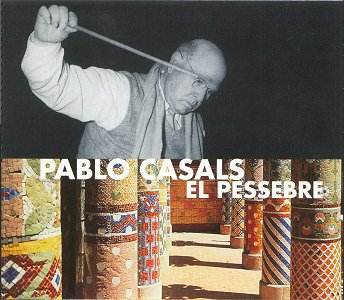PABLO CASALS (1879-1973)
El Pessebre (The Crib) - oratorio (1945?)
 Ana Maria Sanchez (sop)
Ana Maria Sanchez (sop)
Raquel Pierrotti (con)
Joan Cabero (ten)
Enric Serra (bar)
Stefano Palatchi (bass)
Orfeo Catala
Cor de Cambra del Palau de la Musica/Jordi Casas
Orquestra Sinfonica de Barcelona I Nacional de Catalunya/Lawrence Foster
rec Barcelona 3-6 Sept 1997
 AUVIDIS IBERICA NAIVE
V4866 2 CD set [47.03+49.57]
AUVIDIS IBERICA NAIVE
V4866 2 CD set [47.03+49.57]

This is, I believe, a first. Casals' oratorio has not been recorded before
- at least not complete. A couple of orchestral extracts have been in circulation
usually on the same disc as Casals' Song of the Birds (Cant des
Ocells) but never the whole work.
El Pessebre has its origins in Catalan folk traditions. As in several
countries the Catalans have a Christmas tradition of creating a Crib Scene
with the Shepherds, Wise Men, Mary, Joseph and the infant Jesus.
The Oratorio sets words by Joan Alavedra (1896-1981), a family friend of
the Casals. The 1943 Perpignan Festival saw a poetry contest for Catalan
poets. Alavedra's 'Poema del Pessebre' won. Casals immediately set about
a musical setting.
Casals rejected Franco's fascism and refused to premiere the work in Spain.
Instead it was given for the first time in Acapulco, Mexico, on 17 December
1960. Since then it has been performed in Geneva (May 1967).
Casals' language is far from difficult. The atmosphere oscillates between
folk-naive to Brahmsian romance. The folk aspects are clear from the start.
They are also evident in the piping of the 'merry note' at track 11 7.20
(CD2). A similar feeling is communicated by Martinu's cantatas such as Mikes
from the Hills and Smoke from the Potato Fires as well as parts
of Szymanowski's Harnasie and Vaughan Williams' Hodie and The
First Nowell.
Alongside this rustic innocence there is music (especially the choral side)
of Handelian charm and canonic patterning. This bumps into Siegfried Idyll
contentment (El Labrador) and chipper wind writing
(Meistersingers-style). The Deutsches Volkslieder of Brahms,
Schumann's Roserpilgerfahrt and Faust and the a cappella
motets of Othmar Schoeck are also stylistic parallels. We even get a
touch of Rimskian exoticism in the music for the Three Kings. The
singing is usually excellent although the baritone is not ideally steady.
The music is not indelibly impressive. Of Casals' sincerity there is no doubt
but sincerity is not enough to avoid blandness setting in from time to time.
There is nothing anodyne however about the uproar of the Hosanna on
CD2 which roars with life and verve.
The booklet gives the text in sung Catalan as well as Castilian, English,
French and German. Sadly the texts are not printed in side by side columns.
Highly recommended to choral conductors looking for a novelty for Christmas.
There is much here to enjoy.
Rob Barnett

NOTE
I had thought that this was a first recording.
I was wrong and would thank Georges Murnu for putting me right. In
fact there was a Columbia recording of Casals conducting the work.
This was issued on a CBS LP in 1974 as M2 32966 (probably the late
60s). The artists were: Olga Iglesias, soprano; Maureen Forrester,
mezzo-soprano; Paulino Saharrea, tenor; Pablo Elvira, baritone; Carlos
Serrano, bass-baritone; Puerto Rico Conservatory of Music Chorus (Sergije
Rainis, chorus master) Festival Casals Orchestra of Puerto Rico (Alexander
Schneider, assistant conductor). The LP included a complete libretto.
In addition a couple of orchestral extracts have been in circulation
usually on the same disc as Casals' Song of the Birds (Cant des Ocells).
Michael Bryant adds
I have a mono recording of the performance in Geneva
on May 29, 1967 issued by the IOS organisation (Bernard Cornfeld)
(IOS 001 - 2LPs) conducted by the composer's brother Enric Casals.
With:
Olga Iglesias
Norma Proctor
Jaume Baro
Georges Moutsios
William Wakefield
Lamoureux Concert Orchestra
L'Orfeo Catala (choir)
William Brewer adds:-
Your article brought back memories for me since Casals himself held master classes at Carnegie Mellow University back in 1965-66. It was then Carnegie Institute of Technology. I also remember that the orchestra performed this interesting work, playing from manuscripts. I believe he brought in his favorite soprano at the time and don't remember her name. It may well be the same lady on the recording you reviewed. All I remember is that Casals demanded that she sing the part. It is so refreshing to find that this work has survived and has been professionally recorded. I have a poor tape recording of the Casals' recording that is no longer available. Apparently, I taped it off the radio back in the 1960s. There is a glorious soprano in this performance.
